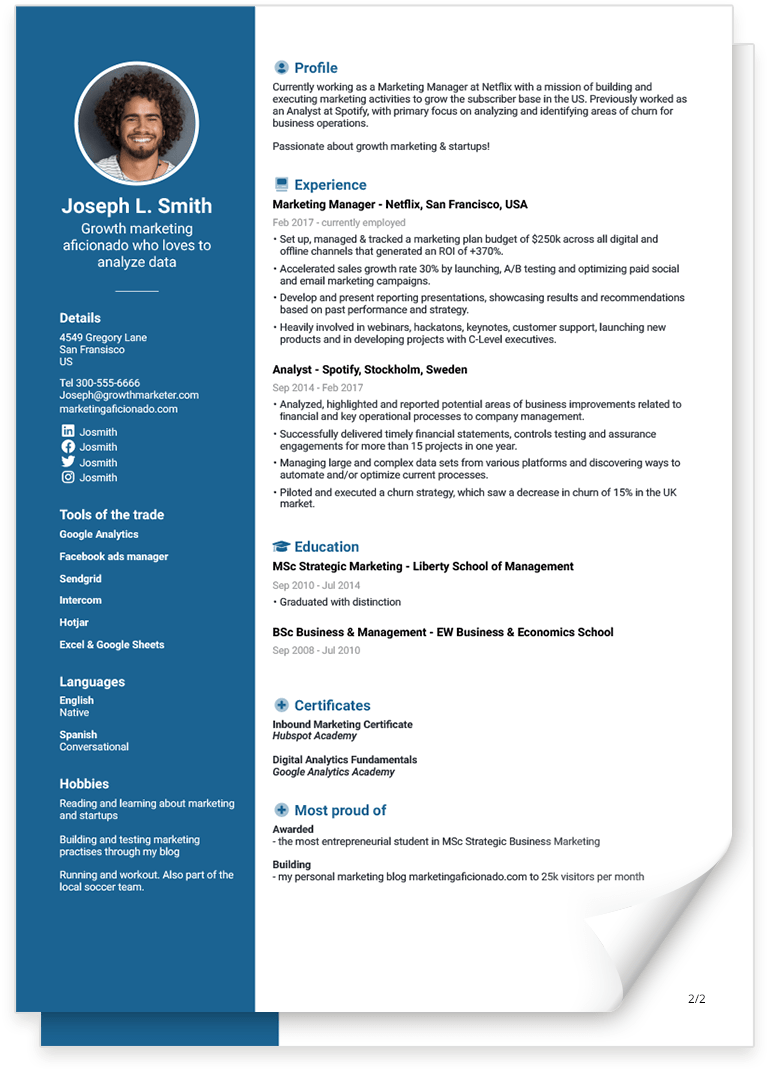How To Use Power Words in Your Resume [examples]
![How To Use Power Words in Your Resume [examples]](https://jofibostorage.blob.core.windows.net/blog/how-to-use-power-words-in-your-resume.jpg)
Power words! The mere look and feel of the term is enough to impress, right? You might have many questions regarding power words.
What are they? Who uses them? And also not least, why even use power words? In this post I will answer just that.
In the following I will guide you through how and where to use this famed type of words - heck, I’ll even throw in some examples for you to take inspiration from.
What are power words?
Power words are words, or phrases, that will instantly boost your resume.
Some examples could be action verbs such as “redesigned” (“I redesigned the entire filing system to make it more efficient” for example) or “Launched”. Other power words could be “execute”, “increase” and “target”.
You should always try to keep them related to the words listed in the job post. If possible, even reuse the ones the company has used in the job ad.
Power word examples
Try to incorporate some of these examples of power words in your next resume:
- Accelerate
- Acquire
- Achieve
- Build
- Campaign
- Coach
- Conduct
- Define
- Delegate
- Energized
- Enforce
- Focus
- Generate
- Host
- Identify
- Increase
- Integrate
- Launch
- Listen
- Modify
- Negotiate
- Perform
- Prepare
- Prioritize
- Qualify
- Reduce
- Refocus
- Research
- Results
- Simplify
- Solution
- Target
- Transform
- Update
- Validate
- Value
Why use power words?
There are several reasons why you should include power words in your resume. First of all they will make you stand out from the crowd like the Joker from Batman at a formal ball. Second, they are sure to pique the recruiter’s curiosity towards you and that’s what we’re aiming for in a well written resume.
1. Increased readability
When adding power words to your resume you automatically make it easier for the recruiter to know exactly what you’re good at.
Recruiters have to be able to quickly scan your resume and determine if you’re a good match with the company (fact: studies have shown that recruiters spend less than 10 seconds scanning a resume).
By including power words that are related to the job position, you will make her job a lot easier.
2. Better, more fluent, language
When you add power words, you also vary your language. Instead of using worn out phrases like “team player”, “detail oriented”, or “results driven” you show the recruiter that you are able to raise yourself above the masses and shine.
Let me give you an example. You want to let the recruiter know that you’re a team player but you don’t want to use the actual word team player. What do you do? Instead of writing it, you’ll have to show it. Pick the right power words to describe a time when you collaborated with someone and then display the achievements you accomplished.
Use words like acknowledged, contributed and coordinated.
For example:
"During my last three months of employment I coordinated a team effort towards establishing a better work environment.”
This shows that I am able to work in a team and achieve results at the same time = team player.
3. Helps you beat the machines
Yes people, Applicant Tracking Systems (ATS) are a thing. And they are here to stay. That means you are going to have to deal with them in your cover letter and resume. The trick is to focus on keywords. Not on the quantity though but on the quality. In this case your power words, if you keep them closely related to the job post, will help you out.
For more info about how to beat the Applicant Tracking Systems, go to our article 10 Surefire Ways to Beat The Applicant Tracking Systems.
How and where should I use power words?
The most important lesson is not to overdo it, as with everything else. A little sprinkle will get you a long way.
With that being said, it is always a good idea to place your power words at the top of your resume. This is also the position in which you should place your top achievements. That way, when the recruiters skim through your resume, they will notice your power words and achievements and you will have a better chance at being called into an interview.
If you want to know more about why you need a strong professional resume, try reading the article 7 Reasons Why You Need a Professional Resume and then create your very own by using our resume builder.
![Teacher Resume Example & Guide [tips and tricks]](https://jofibostorage.blob.core.windows.net/blog/Teacher-resume-article-small.jpg)
![Follow Up Email After a Job Interview [Examples 2025]](https://jofibostorage.blob.core.windows.net/blog/Follow-up-email-after-job-interview.png)
![Cover Letters That Stand Out in 2025 [6+ Examples]](https://jofibostorage.blob.core.windows.net/blog/Cover-letters-that-stand-out.png)
